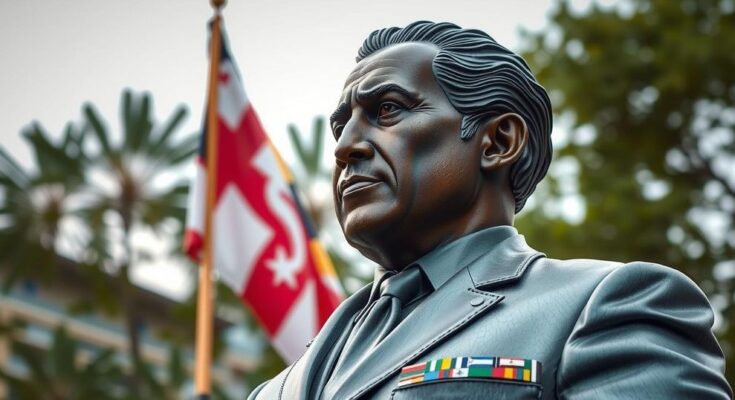The Central African Republic has erected a statue honoring Yevgeny Prigozhin and Dmitriy Utkin to signify its partnership with Russia, which has provided military support since 2017 to stabilize the nation amidst ongoing conflicts. The Wagner Group’s presence has allowed for greater security while granting access to CAR’s abundant natural resources. However, the country remains plagued by poverty and low human development, raising critical questions about the implications of foreign military alliances.
The Central African Republic (CAR) has solidified its alliance with Russia by erecting a statue in honor of Yevgeny Prigozhin, the late founder of the Wagner Group, and Dmitriy Utkin, in the capital city of Bangui. This monument symbolizes CAR’s appreciation for the Russian Federation’s role in maintaining security in the region over recent years. The country’s tumultuous history, marked by civil conflict and struggles over resources, has necessitated military assistance, which Russia has provided since 2017 under a military-technical cooperation agreement. The presence of Wagner forces has not only helped stabilize the government but also granted Russian entities access to CAR’s vast natural resources, fueling further economic entanglement. Despite CAR’s rich deposits of gold and diamonds, it remains one of the poorest countries globally, facing significant challenges in human development and political stability. President Faustin-Archange Touadéra’s administration has been pivotal in forging this relationship with Russia as well as defending the continued presence of Russian military forces, which he claims has substantially improved security. Critics within Africa, however, advocate for internal solutions to conflicts without reliance on foreign assistance. As CAR navigates its complex socio-political landscape, the impact of this alliance and the dynamics of resource exploitation remain critical areas of attention.
The Central African Republic is a landlocked nation in Africa, grappling with prolonged civil unrest exacerbated by political and ethnic tensions. Since the arrival of Russian military personnel, particularly the Wagner Group, in 2017, the government has sought to leverage this partnership for stabilizing its authority and accessing vital resources. Despite its wealth of natural resources, the country is among the poorest globally, suffering from an extensively low Human Development Index. The political landscape of CAR has been marred by a succession of authoritarian regimes and violent conflicts since independence from France in 1960, leading to continued international scrutiny and various peace initiatives.
In conclusion, the unveiling of the statue honoring Prigozhin and Utkin illustrates CAR’s deepening ties with Russia amid its pursuit of security and economic development. While the presence of the Wagner Group has contributed to a semblance of stability, it also raises questions regarding sovereignty and the impact of foreign influence within the nation’s resource-rich context. The juxtaposition of external military support against the backdrop of local governance and development underscores the complexities faced by the Central African Republic as it continues to navigate its challenging realities.
Original Source: moderndiplomacy.eu




